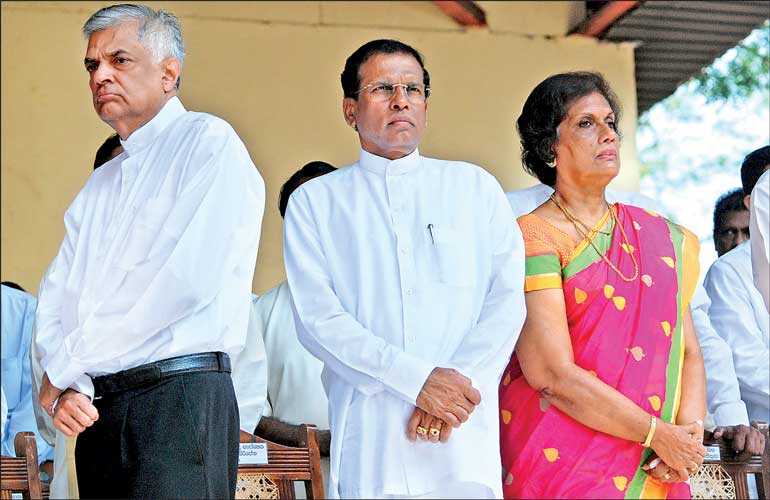Monday Feb 23, 2026
Monday Feb 23, 2026
Friday, 23 August 2019 00:00 - - {{hitsCtrl.values.hits}}

The presidency has not much power some say, but I would say there is plenty for the right person. By intention or otherwise, our Constitution leaves the presidency to be defined by the person occupying the chair. Maithripala Sirisena (MS) showed us the worst one could do. If we give ourselves the freedom to dream about the best, we could at least work for something in between.
Following is my ideal president.
Gets elected with a real majority
As the country has come to realise, you don’t need 50%+ to get elected as president. According to the Section 94 of the Constitution, a voter gets three preferences if there are three or more candidates. As the Chairman of Elections Commission clarified recently, we have a choice of putting a cross against  one name, or marking 1, 2, 3 to give three preferential votes. Sorry you can’t mix crosses and numbers, but you can stop short of marking all three preferences.
one name, or marking 1, 2, 3 to give three preferential votes. Sorry you can’t mix crosses and numbers, but you can stop short of marking all three preferences.
If no one person get 50+ in the first round, all except the two leading contenders are eliminated and the preferential votes cast for the top two in the ballots of the other contenders are tallied. The new total is all the first, second and third preferences received by the two top candidates. The one who gets most of this new total gets elected. It is possible that not many people cast a second or third preference and we end up with a president who has received much less than 50% of all votes.
As the JVP said somewhere, its intent is to weaken the presidency in this manner. A president elected by 42% say, is a politically weak president, partially achieving what a 20th Amendment to abolish the presidency would have done. I don’t agree. MS showed us the damage that an insecure president can do. If we spend our time and money electing a president, we better get one with stature.
With a majority in Parliament too
We should not wish a minority government for any incoming president, irrespective of our personal preferences for the candidates. We have had enough attempts at cohabitation, first with Chandrika as President and Ranil as Prime Minister (PM) and then with MS as President and Ranil as PM. (Wait a minute, Ranil was the common factor in the two instances, but never mind).
Problems of cohabitation governments are well documented. As the International Institute for Democracy and Electoral Assistance notes: “Without the powers of legislative leadership and agenda-setting, it may be difficult for presidents to fulfil their electoral promises or to respond to emerging needs or public demands. This may result in a deadlock between the branches of government, which could then impede the passage of necessary laws. Such a deadlock may also lead to an under-performing government, stagnation and poor policy outcomes, and potentially contribute to general frustration and public disillusionment with the democratic system. In extreme cases, a president may attempt to overcome the deadlock by extra-constitutional and undemocratic means (Linz 1992). Thus, wherever an elected president is expected to play an active part in deciding policy, effective democracy requires that the president have enough leadership, legislative and agenda-setting powers to enable her or him to act decisively and responsibly for the public good.”
Tired of cohabitation between PM and President, recently France brought legislation to bring presidential and parliamentary terms to sync, increasing the chances of the president and PM being from the same party. Here in Sri Lanka, if a Presidential Election is held in November and the incoming president uses his power to dissolve and hold a general election soon after, we too can hope for a president and the PM coming the same party. If the Parliament learns from past misadventures to back a PM who not only commands a majority but is able to work with the president, this country can some hope for the future, no matter which party wins.
A simple majority was possible in Sri Lanka in the general elections of 1989 and 2010, former in the middle of an undeclared war, and the latter soon after victory over LTTE. In ‘normal times’ PR electoral systems typically do not yield majority governments. It is in our common interest to wish for some political stability for this country under whichever party, by way of a simple majority but not two thirds to give unlimited powers.
Has a good chemistry with the PM
During the last year we saw how a bad chemistry between a president and PM can harm a country. In the Podu Jana Permauna coalition where Gotabaya Rajapaksa is the declared candidate, we already have a line up for portfolios with brother Mahinda Rajapaksa as PM and other two brothers more than likely to hold key positions. We should not hold our breath for sibling rapport here.
Most famous sibling politician duo, JFK and RFK in USA, was a situation where with big brother was President and the little brother was Attorney General. Their body language exuded trust and affection. Here we have the littlest brother Rajapaksa contending to become president, and the body language of the older brother so far does not look good. Hopefully, the power struggle inside government would be a peaceful one for this aspiring pseudo-royal family, not a palace coup ending in a blood bath like in Nepal.
In contrast, the UNP camp is already looking like one big fist fight, but in the US, it is what they call the primaries, or elections preceding a Presidential Election to decide on the nominations from each of the two main parties. Even though primaries are a later phenomenon, presidential candidacy in the US has always been a democratic process.
As Doris Kearn Goodwin captures in her landmark book ‘Team of Rivals – The Political Genius of Abraham Lincoln,’ a newly-elected Lincoln wooed his three formidable rivals for the Republican nomination – Senator Seward, Governor Chase and senior statesman Bates who fought for the candidacy in Republican convention of 1860 – by offering them key positions in his Cabinet, and worked extra hard to keep the peace within his Cabinet.
I suggest that the UNP contender read ‘Team of Rivals,’ but I am hard pressed to suggest reading material for the Gotabaya camp. However, I can see a novel in the making – say, ‘Seven Portfolios for Seven Brothers’ – like the popular book and the movie, ‘Seven Brides for Seven Brothers’. In fact, there are seven brothers in the Rajapaksa clan if you count MR’s three sons.
Whoever who comes to power in 2020, let us wish for a president who can give leadership to a team of rivals, even if within a family.
Can maintain a smart cabinet of 30 or less
In this country we managed to limit the size of the cabinet to 30 through Amendment 19 to the Constitution, but with the escape clause of increasing the number to 48 in the case of a national government, with the definition of a national government open to interpretation. Shame on us for delaying this important provision for so long and then diluting that.
A recent search for cabinets in 15 relevant countries in the Developed world (USA, UK and Australia), South Asia (India, Bangladesh, Nepal), South East Asia (Malaysia, Singapore and Thailand), and East Asia (South Korea, Taiwan and Vietnam) showed that on average they have no more than 25 members in a cabinet.
If this country is to move forward, it is critical that we maintain a cabinet of no more than 30 and interpret a national government to mean a government formed between two major parties in Parliament at a time or national emergency or such. Nobody would anything done in the crazy rounds of musical chairs that the presidents have been conducting in the name frequent cabinet reshuffles. Performance targets for ministers too are a must.
Gets the Presidential Secretariat in order
The president of the country gets a substantial budget allocation and it is squandered on advisors who can offer no advice, and perks and foreign jaunts to curry favours with miscellaneous political actors. In Sri Lanka, by law, the cabinet is comprised of members of Parliament and the president is the head of the cabinet. There is no formal organisational structure to the Presidential Secretariat.
In contrast, in the US, the President’s Office of is a separate executive body and the president is free to choose his cabinet subject to ratification by the Senate. In Indonesia the only country with a presidential system akin to us, the cabinet comprises roughly 50% parliamentarians and 50% technocrats.
In Sri Lanka, there is no reason why the President Secretariat should not have a group of technocrats paralleling the cabinet portfolios, to assist the President to evaluate or even formulate polices and track the progress of implementation.
A qualified chief of staff is a must. And all staff should be required to watch ‘West Wing,’ the TV series! In ‘West Wing,’ the President’s staff formulates policy and works with the Legislature to get them through. Our future leaders should note the number of women in the cast as well, especially the sharp press secretary. Our leaders should look further than their school buddies and hire some young women.
Sets performance standards for ministers
We have a sectoral committee system in Parliament to oversee the executive, but we should make it part of the culture of the government that the executive evaluates itself. The budget in Sri Lanka is supposed to be performance budget. In fact, each ministry gives its performance targets in the budget document. It is time to take these seriously and the president as the head of cabinet oversees the process.
Orchestrates the whole thing like a maestro
The next president may not be able to hold any cabinet portfolios, but he is the head of the State, the head of the Executive and of the Government, and the commander-in-chief of the Armed Forces (Section 30). In addition, the president is also a member of the cabinet of ministers and the head of the cabinet of ministers (Section 42(3)).
The President must act on the advice of the PM for appointing of the cabinet of ministers and the Constitutional Council has final authority on appointments to high positions. However, the president is still free to appoint the secretaries to each ministry and change the cabinet portfolios without the PM’s concurrence. In my opinion, there are enough provisions in the Constitution to orchestrate the business of government, for the right person.